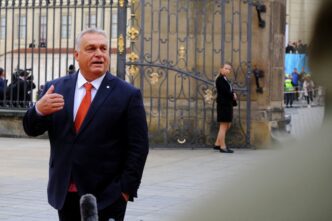Executive Summary
- The United States granted Hungary a one-year exemption from U.S. sanctions targeting Russian oil and gas.
- The decision followed a meeting between President Trump and Hungarian Prime Minister Viktor Orban, acknowledging Hungary’s critical reliance on Russian energy supplies.
- Hungary committed to purchasing U.S. liquefied natural gas (LNG) but maintains significant reliance on Russian energy, deepening its distinct position within the EU on energy policy.
The Story So Far
- Hungary’s critical reliance on Russian energy, with the vast majority of its oil and gas imports coming from Russia and its economy highly vulnerable to supply disruptions, underpins its need for an exemption from U.S. sanctions. This exemption, granted by President Donald Trump, addresses the potential severe economic consequences for Hungary, while also reflecting the strong political alignment and bilateral considerations between President Trump and Hungarian Prime Minister Viktor Orban.
Why This Matters
- The U.S. decision to grant Hungary a one-year exemption from sanctions on Russian oil and gas underscores Hungary’s critical and persistent reliance on Russian energy, leaving its economy vulnerable to future supply disruptions despite a partial commitment to purchase U.S. LNG. This move also highlights a significant carve-out in broader Western efforts to pressure Moscow and reinforces the political alignment between President Trump and Prime Minister Orban, potentially deepening existing divisions within the European Union on energy policy and relations with Russia.
Who Thinks What?
- Hungarian Prime Minister Viktor Orban argues that Hungary’s deep dependence on Russian energy is critical due to geographical challenges and the severe economic and social consequences a cutoff would inflict, necessitating exemptions from U.S. sanctions and opposing EU plans to phase out Russian gas.
- President Donald Trump granted Hungary a one-year exemption from U.S. sanctions targeting Russian oil and gas, acknowledging Hungary’s unique geographical challenges in sourcing alternative energy and securing a commitment for Hungary to purchase U.S. liquefied natural gas.
- Some European Union and NATO allies, along with the IMF and S&P, criticize Hungary’s significant reliance on Russian energy, warning of its vulnerability to energy shocks and potential output losses exceeding 4% of GDP if Russian natural gas supplies cease.
The United States has granted Hungary a one-year exemption from U.S. sanctions targeting Russian oil and gas, a decision announced following a meeting between President Donald Trump and Hungarian Prime Minister Viktor Orban in Washington on Friday, November 7, 2025. This reprieve addresses Hungary’s critical reliance on Russian energy supplies amid broader U.S. efforts to pressure Moscow over the ongoing conflict in Ukraine.
President Trump had previously imposed Ukraine-related sanctions on Russian oil companies, including Lukoil and Rosneft, which carried the threat of further penalties on entities in countries purchasing oil from these firms. The exemption for Hungary represents a significant carve-out from these measures, reflecting specific bilateral considerations.
During his White House visit, Prime Minister Orban, a long-time political ally of President Trump, articulated Hungary’s deep dependence on Russian energy. He emphasized the severe economic and social consequences that a cutoff of these supplies would inflict upon the Hungarian people and economy.
President Trump appeared receptive to Orban’s arguments, acknowledging Hungary’s unique geographical challenges in sourcing alternative energy. “It’s very different for him to get the oil and gas from other areas,” President Trump remarked, noting Hungary’s landlocked status and lack of direct port access.
In conjunction with the sanctions exemption, a White House official confirmed that Hungary committed to purchasing U.S. liquefied natural gas (LNG) through contracts valued at approximately $600 million. This agreement signals a partial diversification effort, even as reliance on Russian supplies continues.
Hungary has maintained its significant reliance on Russian energy since the 2022 conflict in Ukraine, drawing criticism from some European Union and NATO allies. International Monetary Fund (IMF) figures for 2024 indicate that Hungary sourced 74% of its gas and 86% of its oil from Russia.
The IMF has also warned that an EU-wide cessation of Russian natural gas could lead to output losses in Hungary exceeding 4% of its Gross Domestic Product (GDP). Ratings agency S&P has further noted Hungary’s energy-intensive economy and its domestic refineries’ design to process Russian Urals crude oil, underscoring its vulnerability to energy shocks.
The two leaders also discussed Russia’s war with Ukraine. President Trump expressed his view that Russia “just don’t want to stop yet” fighting, while Prime Minister Orban responded that a “miracle can happen” regarding Ukraine’s potential victory.
Economic Cooperation and Political Alignment
Prime Minister Orban predicted a “golden age” for U.S.-Hungary relations and used the meeting to criticize the Biden administration, aligning with President Trump’s political stance. President Trump publicly endorsed Orban for his upcoming 2026 election, praising his immigration policies.
The EU’s top court recently ruled that Hungary must pay a 200 million euro ($216 million) fine for not implementing changes to its policy on handling migrants and asylum seekers at its border. It also imposed a daily fine of one million euros until full implementation. Orban stated that Hungary would manage its internal EU disputes independently.
Hungary has actively pushed back against plans by the European Commission to phase out all EU imports of Russian gas and LNG by the end of 2027. This position deepens its existing disagreements with Brussels over energy policy and its broader relations with Moscow.
Implications for EU Energy Policy
The U.S. decision to grant Hungary a sanctions waiver underscores the complex interplay between geopolitical strategy, national energy security, and internal European Union dynamics. While providing immediate relief to Hungary, it also highlights the nation’s continued deep energy ties to Russia and its distinct position within the EU on energy and foreign policy.








